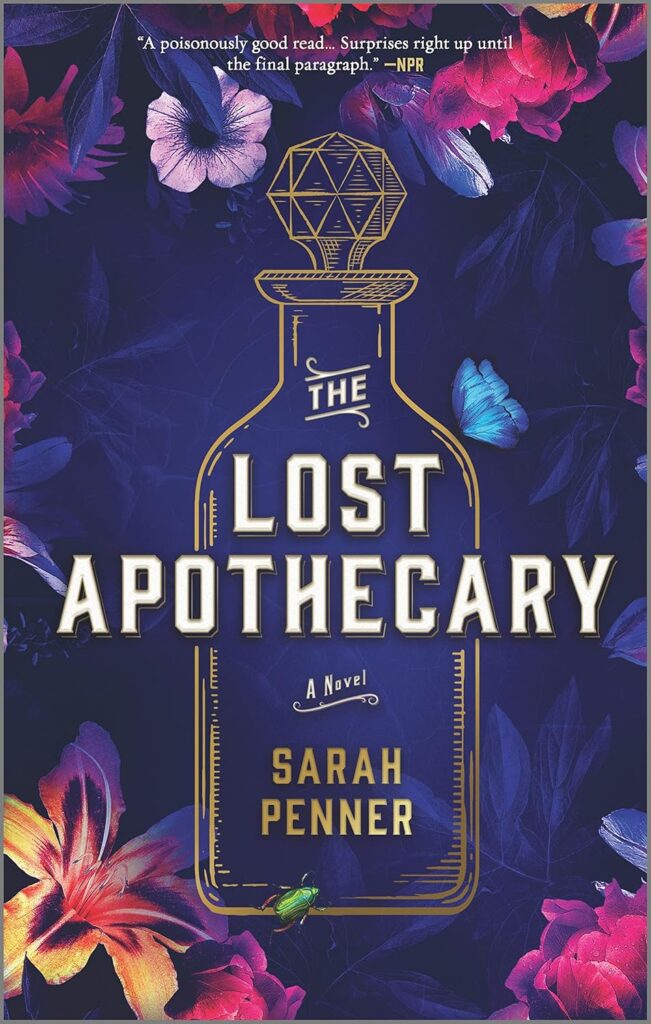What if I told you that a tiny vial, dug up from the muddy banks of a river, could connect a modern woman’s mid-life crisis to the clandestine secrets of an 18th-century poisoner? Sounds like a plot twist straight out of a stylish historical drama, doesn’t it? Well, thank Sarah Penner for giving us just that in her debut novel, The Lost Apothecary. This New York Times bestseller interlaces two timelines—a gritty 1791 London and a present-day self-discovery trip—to craft a tale of vengeance, empowerment, and everything in between.
Sarah Penner’s novel has drawn acclaim for its originality and intoxicating storytelling. And, honestly, “intoxicating” feels very on-brand here, given the poison-laced premise of the story. For more insight into its reception, you might check out this review on NPR, which highlights the book’s suspenseful narrative and meticulous character work.
Table of Contents
The Mesmerizing Dual-Timeline Narrative
Nothing keeps a reader on their toes quite like dual timelines, and boy, does The Lost Apothecary deliver. The story unravels in alternating chapters, bouncing between 18th-century London, where we meet Nella, a notorious apothecary, and modern-day London, where Caroline Parcewell embarks on an unexpected journey of rediscovery. These two storylines are entangled in ways that, at first glance, seem impossible. But as the plot deepens, Penner masterfully shows how centuries-old secrets can ripple into the present.
This structure isn’t just a fancy literary trick; it’s the heartbeat of the novel. The past feels personal, the present feels haunted, and the transitions? Absolutely seamless. For anyone fascinated by how authors juggle dual narratives, this deep dive from Book Club Chat offers fantastic insights.
Nella and Eliza: A Secretive Apothecary
Now, let me introduce you to Nella, whose apothecary is anything but your neighborhood pharmacy. This woman doesn’t cure headaches; she engineers retribution through poisons. Her clientele? Exclusively women. Her specialty? Helping them take revenge on abusive husbands and untrustworthy lovers. The apothecary is equal parts terrifying and liberating—a sanctuary for women seeking control in a world that denies them agency.
And then there’s Eliza, a precocious 12-year-old who stumbles into Nella’s life and flips it on its head. Eliza is naïve and brimming with curiosity, which, as you might imagine, can get dicey in a shop filled with lethal substances. Their dynamic is both heartwarming and precarious, and it’s a relationship that laces the historical narrative with tension and humanity.
Caroline’s Modern-Day Discovery
Fast-forward to the present, where we meet Caroline Parcewell. Freshly betrayed by her cheating husband, Caroline finds herself mudlarking along the River Thames—a peculiar hobby that involves searching for old objects in river mud. (Quirky? Yes. Therapeutic? Also yes.) She unearths an ancient apothecary vial, and before she knows it, she’s neck-deep in a mystery that bridges modernity and history.
Caroline’s arc is a testament to second chances and self-reinvention. Her journey is compelling, not because she’s perfect, but because she’s relatable. If you’ve ever had a “How did I get here?” moment in life, you’ll see a bit of yourself in Caroline.
How the Two Timelines Blend
The beauty of The Lost Apothecary lies in how these two worlds collide. Every chapter snaps together like pieces of a well-engineered puzzle. Just as Nella’s story delves into betrayal and redemption, Caroline uncovers layers of history that challenge her understanding of herself—and the women who came before her. And trust me, when the connection between past and present is revealed, it’s a mic-drop moment.
Themes of Empowerment, Betrayal, and Redemption
At its core, The Lost Apothecary isn’t just about poisons—it’s about power. Specifically, how women reclaim their agency in the face of betrayal, societal limitations, and heartbreak.
Empowering Women Through Action
There’s something deeply satisfying about seeing women take the reins, even when their choices veer into morally ambiguous territory. Nella’s apothecary serves as a metaphorical stage where women who’ve been underestimated or wronged can rewrite their narratives. Similarly, Caroline’s decision to dig into her own history becomes a pivotal act of self-empowerment.
Trust, Lies, and Consequences
Betrayal is omnipresent in this novel, whether it’s Nella’s clients dealing with unfaithful partners or Caroline grappling with her own husband’s deceit. The fallout is messy, human, and painfully relatable. Penner doesn’t offer easy answers because, let’s be real, life is rarely that simple.
Historical Constraints on Women
The 18th-century backdrop of Nella’s story underscores how constrained women’s lives used to be (and, to some extent, still are). Her apothecary became a rare refuge, offering a sliver of autonomy in a patriarchal world. The contrast with Caroline’s era draws attention to how far we’ve come—and how far we still have to go.
Why I Loved The Lost Apothecary
Sometimes, you pick up a book and find yourself glued to it until three in the morning. This was one of those books for me. Penner’s storytelling is a heady mix of vivid historical detail, emotional depth, and just the right amount of suspense.
A Unique Blend of Mystery and History
Historical fiction often leans into drama, but The Lost Apothecary ups the ante by adding a mystery-thriller edge. It’s the literary equivalent of mixing red wine with dark chocolate—unexpected, but oh-so-satisfying.
Emotional Depth and Connection
What truly hooked me was how Penner nailed the emotional beats. Whether it was Nella’s inner torment, Caroline’s quiet resilience, or Eliza’s wide-eyed curiosity, each character brought something authentic and heart-wrenching to the table.
Similar Reads for Fans of The Lost Apothecary
Can’t get enough of dual-timeline stories or tales of women breaking free from societal constraints? Here are a few suggestions to add to your reading list:
Books by Similar Authors
If you enjoyed this, you’ll likely love novels by Kate Morton, like The Forgotten Garden, or Kristin Hannah’s The Nightingale. Both authors excel at weaving historical fiction with compelling female leads.
More Stories of Dual Narratives
For fans of books that hop between timelines, The Night Circus by Erin Morgenstern is a must-read. Its enchanting world-building and layered storytelling might just scratch that itch.
Packing It All Up
So, why should you give The Lost Apothecary a spot on your bookshelf? Because it’s more than just a story about poisons and secrets. It’s an homage to resilience, a toast to reinvention, and a gripping read from start to finish. Whether you’re a historical fiction aficionado or someone who loves unraveling mysteries, this book has something to offer.
And if you’re still on the fence, maybe reading this thoughtful breakdown from Andrea Montgomery will push you over the edge. Trust me, Nella and Caroline’s intertwined journeys are well worth the plunge.

